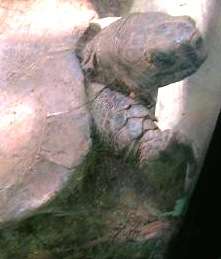Matches Made in Heaven (and Jail): Look at the Troubled Dogs Saved From Euthanasia by Doting Inmates
This program saves rescue dogs from euthanizaton by pairing them with inmates who find rehabilitation in working with the troubled pups.

One of the world's rarest turtle species – the Arakan forest turtle – has been observed for the first time in the wild by scientists according to a new report by the Wildlife Conservation Society (WCS).
Previously known only by museum specimens and a few captive individuals, research scientists discovered five of the light brown spotted turtles in a wildlife sanctuary in Myanmar (Burma) in Southeast Asia. The sanctuary, originally established to protect elephants, contains thick stands of impenetrable bamboo forests and is rarely visited by people.
The species, which can measure up to a foot in length, was believed extinct until 1994, when conservationists found a few specimens in a food market in China. Before then, the last known record of the species was of a single animal collected by a British Army officer in 1908. Many Asian turtle species have been driven to near extinction due to their demand as food.
The team also found yellow tortoises and Asian leaf turtles in the sanctuary – two other species threatened by the illegal wildlife trade.
"We are delighted and astonished that this extremely rare species is alive in Myanmar," said Colin Poole, WCS Director of Asia programs. "Now we must do what we can to protect the remaining population from poachers involved in the illegal wildlife trade throughout Asia."
The report recommends several steps to ensure that the turtles remain protected in the sanctuary. These include training of local protected area staff, conservation groups and graduate students to collect additional data on the species, and establishing permanent guard posts on roads leading in and out of the park to thwart potential poaching.
Zoo Atlanta is the only facility in the world to have successfully bred the Arakan forest turtle, in 2007. Only 12 specimens, in four institutions, exist throughout North America.
(Source: wcs.org)
Be the first to comment